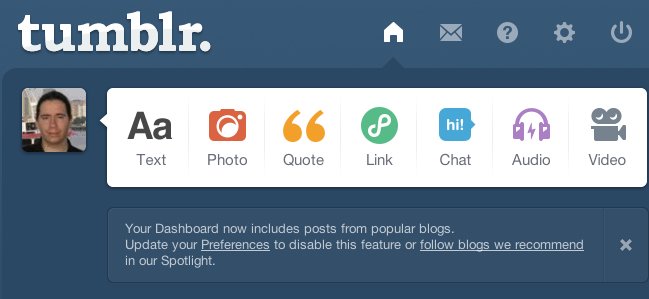Tumblr Causes Millions of Adult Blogs to Vanish
 When Yahoo! recently purchased Tumblr. for $1.1 billion, they had originally hinted that they were not going to make any significant changes, including with adult content, which was prominent on the service.
When Yahoo! recently purchased Tumblr. for $1.1 billion, they had originally hinted that they were not going to make any significant changes, including with adult content, which was prominent on the service.
However, yesterday Tumblr made a drastic change in the way that it handles both “Adult” blogs, one that has effectively caused them to disappear from the Web.
The decision was made to remove blogs deemed to be adult from search results. This means both Tumbr’s internal search results (including tag searches) and, by altering the site’s robots.txt file, from other search engines as well. This, in essence, makes these sites impossible to find through any normal search, including on Google, Yahoo!, Bing or elsewhere.

This move is estimated to impact some 12 million Tumblr blogs, or about 10% of Tumblr’s community.
This includes sites that are both flagged by their owners as adult and those flagged by Tumblr itself (or its community). Sites that are tagged as “NSFW”, the difference being that “NSFW” blogs are occasionally adult-oriented where “Adult” ones are substantially so, are not impacted by this move.
The move has caused an uproar in the Tumblr community, much of it directed at Yahoo!.
If you’re a content creator, adult-oriented or not, this is a difficult lesson that has to be learned. If you value the audience that you are building and the content you’re making, it’s important to remember just how easily one or both can be taken away if you build your metaphorical house on someone else’s land.
Tumblr’s Impact
If you run or operate an adult blog on Tumblr, your site is more or less invisible right now. Though it exists and people can view it if they click a direct link or type the URL, there is no way to search for it, on or off Tumblr.
While Tumblr certainly is free to do what it wants with its service, the unwelcome change to the robots.txt files of millions of sites ensures that webmasters are not the ones truly in control of their sites and that Tumblr will use its position to hide sites that it doesn’t like.
While that might not be a surprise in other communities, especially when it comes to adult content, Tumblr, historically, has thrived on openness and an acceptance of all content. That “hands off” approach to moderating content on the basis of it being “adult” is a big part of why many of these adult sites set up shop on Tumblr, because they felt it was a safe and welcoming community for them.
Though Tumblr didn’t delete the blogs like other services would, Tumblr’s move has more or less guaranteed that these sites can’t grow and succeed. In short, they didn’t boot the porn off of their site, but they hid it and made sure that such sites will likely want to either close down or set up shop elsewhere.
The Tragic Lesson
The lesson in all of this is simple, if you don’t control your site, you can’t predict what will happen to it.
It’s unlikely the webmasters of the 12 million adult blogs on Tumblr thought they would wake up one morning and be booted out of Google and every other search engine. That Tumblr would edit their robots.txt files to prevent them from being in any search engine.
While there’s room to argue if it was an overreaction or an overstepping of boundaries, the fact remains it is Tumblr’s right. While there are advantages to being on services like Tumblr, Blogspot or WordPress.com, you have to remember that you are building a house on someone else’s property and, at the end of the day, they can do what they want with it.
The good news for the affected Tumblr users is that they have the ability to move their site to a WordPress one fairly easily, including keeping their permalinks. But if Tumblr didn’t have an easy exit strategy, many of those 12 million bloggers would be out of luck.
This is why, no matter where you host, it’s important to have backups of your content that you control and, ideally, a domain name that you own. This way, no matter what happens, you can move your site and your work elsewhere quickly.
Bottom Line
Creators of adult or controversial content are the most vulnerable to these issues. It is their content that is most frequently targeted by efforts to “clean up” a service or to make it more palatable for mainstream users and advertisers.
However, this is an issue that can affect anyone at any time.
Please, if you have a site and you cherish your work, purchase and use your own domain and keep good backups of everything you do. Whether it’s a change by your host, a technical issue with your site or even a malicious attack, so many things can happen to your site that you can not afford to risk not having an exit strategy.
Fortunately, there are plenty of places on the Internet you can go but that only matters if you can actually make the move and if your audience can follow you there.
Preparation is the key to making that move.
Want to Reuse or Republish this Content?
If you want to feature this article in your site, classroom or elsewhere, just let us know! We usually grant permission within 24 hours.
